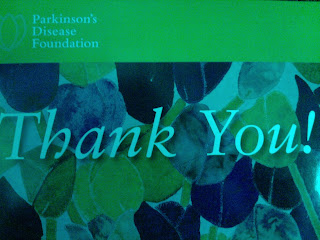Last month, PDF hosted a special screening of the film, A Late Quartet in New York, NY, followed by a conversation with its Director, Yaron Zilberman, PDF Scientific Director Dr. Stanley Fahn and PDF Research Advocate Pam Quinn.
If you haven't yet heard of this film, which is produced by Entertainment One Films, it stars Philip Seymour Hoffman, Catherine Keener, Mark Ivanir and Christopher Walken as a string quartet struggling to stay together in the face of competing egos and ... Parkinson's disease.
As you too often tell us, your neighbors and friends may not truly understand the disease. So when a film puts a spotlight on Parkinson's disease, it is an opportunity to give Parkinson's a name, to let people know the realities of the disease. It's the same reason we all work so hard to raise the profile of Parkinson's disease all year long, particularly during April's Parkinson's Awareness Month.
We would really love to hear your reactions to the film, and its portrayal of Parkinson's disease. Have you seen it? Click here to find a list of screenings.
To start us off, here are a few questions and observations, from PDF:
- Diagnosis: What did you think of the moment when Christopher Walken's character is diagnosed with PD? To many viewers, his silence, followed by a simple "wow" seemed to hit home effectively, communicating a variety of emotions with just one word. Is this similar or different to your own reaction to your diagnosis or a loved one's diagnosis of PD?
- Exercise: You may recognize PDF's own Research Advocate Pam Quinn in the film. She portrays an instructor in an exercise class for people with Parkinson's. In this scene, she talks about how the movements in PD get smaller and smaller, and so people have to make them bigger and bigger. Some viewers pointed this out as a favorite scene. Do you agree? Why or why not?
- Retirement: The time frame of the film seems fairly short, with Christopher Walken's character retiring rather quickly after his diagnosis. Clearly, as a musician his physical dexterity is a very important part of his job. What do you think about the timing of his retirement? How does this cause you to reflect upon the impact of PD on your career?
Jane: It sure rings true for me! I was dxed with PD over three years ago and I was a concert violist. Due to the tremor in my right hand I can no longer play the way I used to and have had to retire from professional viola playing. It is a great loss and have suffered depression as a result. I have had to accept the fact that I can only play simple music, now. This illness has really impacted my life more than it would have if I had not been a musician.
Thanks to all who joined us in New York City for the screening.















































